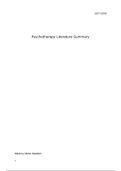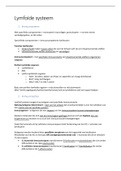Samenvatting
Psychotherapie samenvatting literatuur
- Vak
- Instelling
- Boek
Dit is een volledige, maar toch beknopte samenvatting van alle literatuur (reader en het boek 'Essential findings in counseling and psychotherapy' van Cooper) van het vak Psychotherapie.
[Meer zien]





